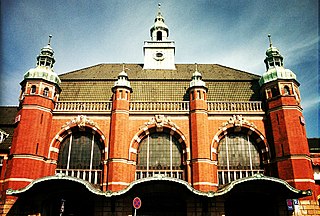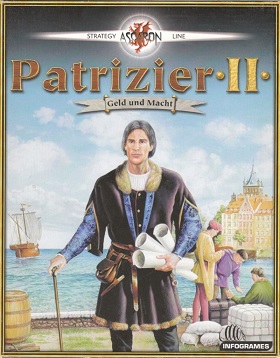
The Hanseatic League was a medieval commercial and defensive network of merchant guilds and market towns in Central and Northern Europe. Growing from a few North German towns in the late 12th century, the League expanded between the 13th and 15th centuries and ultimately encompassed nearly 200 settlements across eight modern-day countries, ranging from Estonia in the north and east, to the Netherlands in the west, and extended inland as far as Cologne, the Prussian regions and Kraków, Poland.

Lübeck, officially the Hanseatic City of Lübeck, is a city in Northern Germany. With around 220,000 inhabitants, it is the second-largest city on the German Baltic coast and the second-largest city in the state of Schleswig-Holstein, after its capital of Kiel, and is the 36th-largest city in Germany.

The State of the Teutonic Order was a theocratic state, located along the southeastern shore of the Baltic Sea in northern Europe. It was formed by the knights of the Teutonic Order during the early 13th century Northern Crusades in the region of Prussia. In 1237, the Livonian Brothers of the Sword merged with the Teutonic Order of Prussia and became known as its branch — the Livonian Order. At its greatest territorial extent during the early 15th century, the State encompassed Chełmno Land, Courland, Gotland, Livonia, Estonia, Neumark, Pomerelia, Prussia and Samogitia.
Artworx was a Naples, Florida software company that produced and supported a line of computer games from 1981 to 2015. It is named after the founder's given name. At first the company published a variety of games, including titles in adventure and arcade-action genres, but were later best known for a strip poker series.
Ascaron Entertainment was a video game developer based in Germany. Founded as Ascon by Holger Flöttmann in 1991 and later renamed in October 1996 due to the possible confusion with the Swiss company Ascom AG, the company produced titles primarily for the PC until it became insolvent in 2009.
The Steelyard, from the Middle Low German Stâlhof, was the kontor of the Hanseatic League in London, and their main trading base in England, from the 13th and 16th centuries. The main goods that the League exported from London were wool and from the 14th century woollen cloths. An important import good was beeswax. The kontor tended to be dominated by Rhenish and Westphalian traders, especially from Cologne.

The Patrician is a 1992 historical trading simulation video game for Amiga, Atari ST and MS-DOS developed by Ascaron Entertainment and published by Triptychon Software. In the game, the player assumes the role of a merchant in any of several cities of the Hanseatic League, accumulating money, capital and consumer goods, and real estate, expanding his company, and furthering his career at home and abroad.

The Lübeck law was the family of codified municipal law developed at Lübeck, which became a free imperial city in 1226 and is located in present-day Schleswig-Holstein. It was the second most prevalent form of municipal law in medieval and early modern Germany next to the Magdeburg Law.

Tapete Records is an independent record label based in Hamburg, Germany.

The Stecknitz Canal was an artificial waterway in northern Germany which connected Lauenburg and Lübeck on the Old Salt Route by linking the tiny rivers Stecknitz and Delvenau, thus establishing an inland water route across the drainage divide from the North Sea to the Baltic Sea. Built between 1391 and 1398, the Stecknitz Canal was the first European summit-level canal and one of the earliest artificial waterways in Europe. In the 1890s the canal was replaced by an enlarged and straightened waterway called the Elbe–Lübeck Canal, which includes some of the Stecknitz Canal's watercourse.
Gödeke Michels, also known as Gottfried Michaelsen in High German, was a German pirate and one of the leaders of the Likedeeler, a combination of former Vitalienbrüder.

The Guild 2 is a life simulation video game developed by 4HEAD Studios and published by JoWooD Productions. It is the second installment in The Guild series, following Europa 1400: The Guild and preceding The Guild 3. The game was released worldwide in November 2006 for Windows. Taking place within fictional versions of provinces of Europe in the fifteenth century, The Guild 2's main focus revolves around the player character's aim to simulate life in the Renaissance. At the beginning of the game, the player can create a self defined character, whereby characteristic attributes points and skills can be adjusted and developed over the course of the game, by improving its properties and special abilities.

The Treaty of Utrecht was signed in 1474 after the Anglo-Hanseatic War between England and the Hanseatic League.
The Anglo-Hanseatic War was a conflict fought between England and the Hanseatic League, led by the cities of Danzig and Lübeck, that lasted from 1469 to 1474. Causes of the war include increasing English pressure against the trade of the Hanseatic cities on the southern coast of the Baltic Sea.

The Hanseaten is a collective term for the hierarchy group consisting of elite individuals and families of prestigious rank who constituted the ruling class of the free imperial city of Hamburg, conjointly with the equal First Families of the free imperial cities of Bremen and Lübeck. The members of these First Families were the persons in possession of hereditary grand burghership of these cities, including the mayors, the senators, joint diplomats and the senior pastors. Hanseaten refers specifically to the ruling families of Hamburg, Lübeck and Bremen, but more broadly, this group is also referred to as patricians along with similar social groups elsewhere in continental Europe.

Lübeck Hauptbahnhof is the main railway station serving the Hanseatic city of Lübeck, in the German state of Schleswig-Holstein. It is a through station at the western edge of the city centre. With around 31,000 travelers and visitors each day, Lübeck Hbf is the busiest of all the railway stations in Schleswig-Holstein. It is classified by the Deutsche Bahn as a category 2 station.

Johann Wittenborg was a merchant and mayor of the free port of Lübeck in what is now north Germany. He was admiral of the Hanseatic fleet at the Battle of Helsingborg and was tried and beheaded after losing this battle.

Patrician II: Quest for Power, entitled Patrizier 2: Geld und Macht in Germany, is the second video game from developer Ascaron in their Patrician series. The sequel to The Patrician, it is a game simulating trading, piracy, politics, and economy. An expansion pack, Patrizier 2: Aufschwung der Hanse, was released in Germany in 2001. A compilation release containing the main game and the expansion was released as Patrizier 2: Gold Edition in Germany in 2002 and as Patrician III: Rise of the Hanse internationally in 2003. A sequel, Patrician IV, was released in 2010.

Bernd Edgar Jorkisch is a German entrepreneur. He is managing partner of the timber importer Jorkisch GmbH & Co. KG in Daldorf, Schleswig-Holstein, and honorary consul of the Republic of Finland.

Tim Klüssendorf is a German economist and politician of the Social Democratic Party of Germany who has been serving as the member of the Bundestag for Lübeck in the 2021 German federal election.















